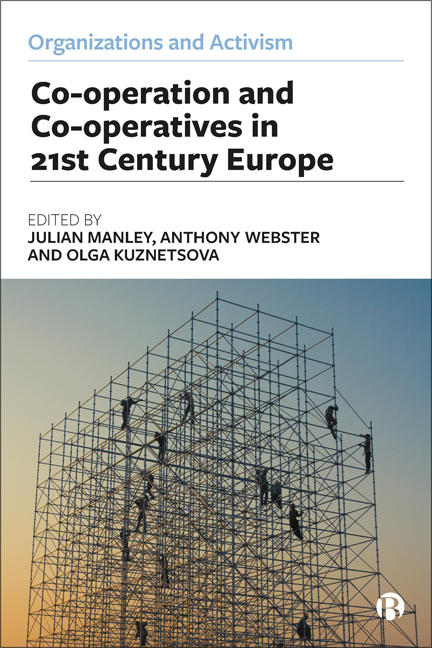Book contents
- Frontmatter
- Dedication
- Contents
- Series Editors’ Preface
- List of Figures and Tables
- List of Abbreviations
- Notes on the Contributors
- Acknowledgements
- Foreword
- 1 Introduction: European Co-operativism in a Changing World
- PART I Seeds: Identifying the Space for Co-operatives in Addressing Social Challenges
- PART II Bridges: Co-operative Culture and Education
- PART III Growth: The Preston Model, Co-operation and Community Wealth Building
- Index
12 - ‘Can a Leopard Change Its Spots?’ How the Established Model of the Mondragon Co-operatives Struggles to Adapt to a Changing World
Published online by Cambridge University Press: 28 March 2024
- Frontmatter
- Dedication
- Contents
- Series Editors’ Preface
- List of Figures and Tables
- List of Abbreviations
- Notes on the Contributors
- Acknowledgements
- Foreword
- 1 Introduction: European Co-operativism in a Changing World
- PART I Seeds: Identifying the Space for Co-operatives in Addressing Social Challenges
- PART II Bridges: Co-operative Culture and Education
- PART III Growth: The Preston Model, Co-operation and Community Wealth Building
- Index
Summary
The sign of vitality is not to last, but to renew and adapt.
Arizmendiarrieta, quoted in Isasti and Uribe, 2021, p 257The co-operative must be reconstituted and renewed every day.
Arizmendiarrieta, 2013, p 116Introduction
Despite claims made by theories of degeneration (Cornforth et al, 1988; Mellor et al, 1988; Pendleton, 2001), the co-operatives of Mondragon appear to both sustain themselves and continue to grow in different ways. This apparently contradicts theories of degeneration that suggest that cooperative businesses ‘degenerate’ in time and either collapse or become little different to the straightforward capitalist model businesses that they were originally attempting to challenge. As Bretos and colleagues (2019) explain, academic studies of co-operatives in a capitalist setting often condemn cooperative businesses to failure through ‘degeneration’, which suggests that co-operatives ‘must adopt the same forms and priorities as capitalist firms if they are to survive in the market’, and that they eventually degenerate into oligarchies (Bretos et al, 2019, p 436). The final conclusion of this process is an eventual transformation into capitalist firms. Cornforth (1995) and more recently Langmead (2017), an author in this edition (see Langmead and Webster, Chapter 4), and others (Paton, 1989; Spear and Voets, 1995; Storey et al, 2014), have argued against the degeneration thesis through studies of worker co-operatives, both in the UK and Mondragón. It is the Mondragón case that is the focus of this chapter, the biggest and longest-lived network of worker-owned co-operatives in the world. Arguably, the worker-owned co-operative is the starkest alternative challenge to the neoliberal status quo in business organizational structures, with the hierarchical pyramidal structure of the cooperative organization being completely inverted from that of traditional business (see, too, Kuznetsova and Kuznetsov, Chapter 8). However, this alternative is no longer an alternative when or if it becomes mainstream (Parker et al, 2014), as would be the case according to degeneration thesis. Therefore, many predicted the beginning of the end for the Mondragon co-operatives after the fall into bankruptcy of the largest and the founding co-operative, Fagor Electrodomesticos (FED) in 2013. The extent of this disaster for the Mondragon system is palpable upon reading Molina's 2012 eulogistic article on FED, ironically published just before the co- operative's rapid demise (Molina, 2012).
- Type
- Chapter
- Information
- Co-operation and Co-operatives in Twenty-first-Century Europe , pp. 216 - 233Publisher: Bristol University PressPrint publication year: 2023

